



















As we bid farewell to the warm days of summer and welcome the sights and sounds of fall and winter, I am thrilled to share an update from your local community hospital as we have much to celebrate.
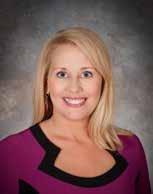
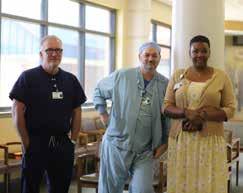
Earlier this summer, the West Calcasieu Cameron Hospital (WCCH) Board of Commissioners approved our 2023 Community Health Needs Assessment (CHNA) and Community Health Implementation Plan (CHIP). WCCH partnered with the Louisiana Public Health Institute (LPHI), to collect and assess data about our community’s health needs and strengths. Based on the findings, WCCH identified three (3) priority health issues and has developed a subsequent action plan to address these issues which are: 1.) Access to Care; 2.) Mental & Behavioral Health; 3.) Chronic Disease Prevention and Management. The full CHNA and CHIP can be accessed by visiting wcch.com.
In August, we kicked off our 70th Anniversary celebration. Since our founding in 1953, WCCH has been dedicated to serving the health and well-being of our community. We’ve witnessed generations of families grow, heal and benefit from the care we provide. Our mission — which is to treat each patient with the utmost care and dignity — remains at the forefront of our operations. It has — and will continue to be — our honor to serve the healthcare needs of our community.
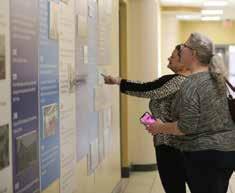
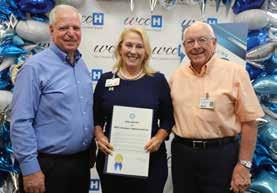
While it’s important to look back, it’s even more important to look ahead. We are excited about upcoming opportunities to serve our community in outreach, education and care.
On Saturday, October 21, WCCH will hold the Ethel Precht Hope Breast Cancer Walk of WCCH at the Lake Charles Civic Center. Last year, the event raised over $90,000, with more than 2,000 participants. We are proud of what we accomplished and are excited to build upon that momentum this year. Special thanks to our sponsors; they help make this event possible and we are immensely grateful for their support. Registration details can be found in this issue of Healthwise.
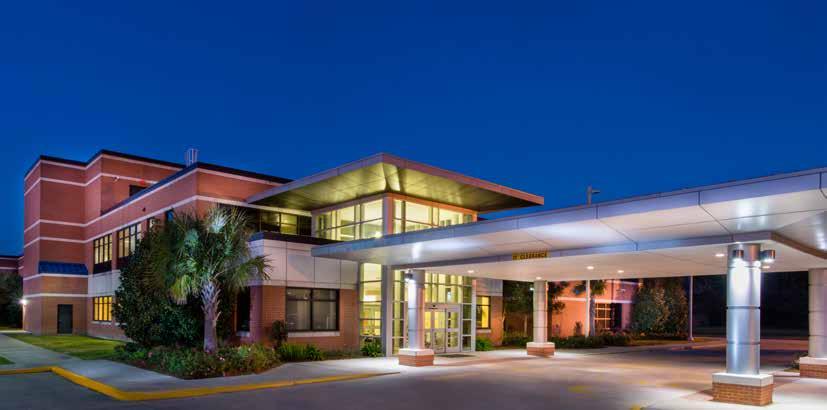
In closing, I want to thank this community for your unwavering support. Thank you for being an integral part of our hospital’s journey. Together, we’ll continue to build a healthier and stronger community.
Here’s to the next 70 years.
 Janie D. Frugé, CEO West Calcasieu Cameron Hospital
Janie D. Frugé, CEO West Calcasieu Cameron Hospital
When facing a difficult situation, having a guide to help direct you through the obstacles and decisions is important. For women facing breast cancer, the West Calcasieu Cameron Hospital (WCCH) breast health navigation program is a critical component in reaching a healing resolution.
Amanda LeBleu was diagnosed with breast cancer in 2021 at age 36. After discovering a lump in her breast, her primary care physician recommended a mammogram, which showed stage 2 cancer.
“I had so many emotions, it was overwhelming,” explains Amanda. “I met Heather, the breast cancer navigator, during the mammogram and she was a lifeline for me. She was there to explain everything right from the beginning.”
Amanda underwent chemotherapy at WCCH and had a double mastectomy with reconstruction in New Orleans. Today, she is cancer-free.
WCCH’s breast cancer navigation program supports women with abnormal mammograms in receiving a timely diagnosis and treatment plan. Heather

LaBauve, breast health navigator with WCCH, was the support angel for Amanda throughout her experience.
“I am a constant point of contact for them with any questions or concerns,” she explains. “From a diagnosis to the start of any treatment can feel very long and scary for a patient, so it’s important for them to have someone they can rely on to answer any questions and calm their concerns. I help them navigate through the initial diagnosis and then onto their treatment plan which can include surgery, medical oncology referrals, chemotherapy discussion, radiation oncology referrals and radiation discussion.”
Amanda says Heather was amazing. “I didn’t really know much about treatment options, what was going to happen, and I had so many questions. Heather explained everything.”
One of the programs that Amanda was able to utilize was the Ethel Precht Hope Breast Cancer Program of WCCH. All proceeds go directly to individuals in Calcasieu and Cameron parishes who are undergoing breast cancer treatment.
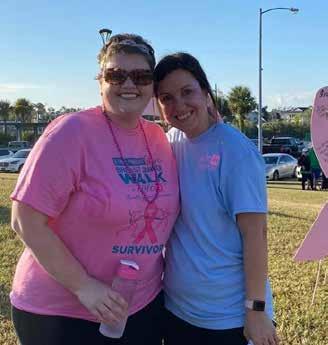
“Heather told me about the program
Amanda explains. “The monetary assistance helped with travel expenses for my surgeries in New Orleans. Even with good insurance, we have so many expenses that are not covered. To receive help from a local organization means so much.”
Heather helps direct patients to local resources for support, wigs, head wraps and whatever is available to make them more comfortable throughout their treatment. “If they receive chemotherapy, I help prepare them for that experience. Overall, I am a source of information and support for the patient and their family during their breast cancer journey,” Heather says.
“Heather is right where she needs to be,” Amanda says. “She is amazing and was a steady resource for me throughout the ups and downs of this experience. I could count on Heather for everything, every single step. I didn’t feel like a patient with her; she was my saving grace.”
In the 1940s and 50s, Sulphur grew rapidly thanks to the addition of several large industries that were contributing to the manufacturing and fuel needs during WWII and the postwar boom. These companies relocated hundreds of employees and their families from across the country; that, along with the natural progress of a vibrant city, enhanced the growth of Sulphur and surrounding areas.
With the growing number of families came the need for quality healthcare in the community where they lived and worked. “Civic leaders, physicians and dentists realized the desperate need for a healthcare facility west of the Calcasieu River and took the necessary action to bring the need to reality,” explained Frank Gayle, administrator of West Calcasieu Cameron Hospital from 1963 – 1991, in a hospital newsletter published in 1978.
On August 19, 1953, West Calcasieu Cameron Hospital (WCCH) was established — a 50-bed hospital dedicated to serving the healthcare needs of West Calcasieu and Cameron parishes. As a testament to the need of the hospital, the first baby was born two days later.

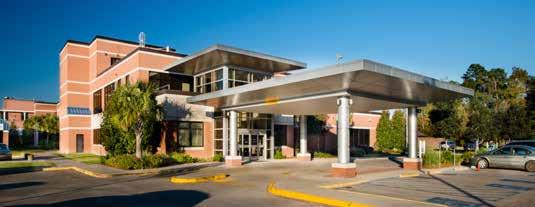
The architectural design of the original hospital was progressive enough to draw attention from Architectural Record, a national publication. WCCH was named one of the five best designed hospitals in 1953 — “an exceptionally good example of planning for function.”
From the beginning, the strength of WCCH has been its
physicians, leaders and employees. Their camaraderie and vision have created a strong foundation. “Beyond the brick, mortar and equipment of the hospital buildings, the health services that it offers are directly related to the employees of the hospital,” explained Gayle. “We have been, over the years, blessed with dedicated, hardworking people who were sincerely interested in providing the finest care possible.”
As WCCH has grown with the community over the last 70 years, the hospital has more than doubled its bed count, completed three major expansion projects, installed the area’s first inhalation therapy department and intensive coronary care unit, added several service lines and implemented the use of top-tier medical devices and technology, all with the highest level of patient care in mind.
“Patient care has always been the driving force of growth and advancements at WCCH,” says Dr. Walter P. Ledet, Jr., general surgeon and member of the WCCH medical staff since 1975. “Since the beginning, the medical staff and hospital administration have approached patient care with a collaborative spirit, which in turn has created a positive synergy that benefits our community.” The medical staff has grown from 12 members to nearly 350 members today, providing access to a wide array of healthcare services.
The science of medicine is ever-evolving, and as new technologies are created, more precise diagnostic and surgical capabilities and treatments become available. Throughout its
years, WCCH has continually invested in state-of-the art technology, to ensure our community has access to the latest in medical advancements here at home.
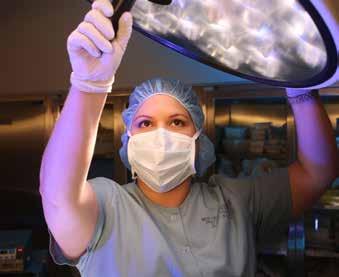
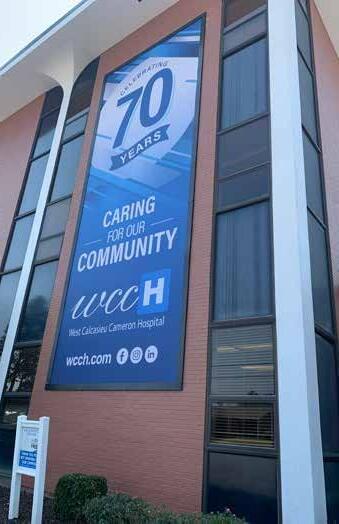
The COVID-19 pandemic tested everyone — from patients to physicians — during 2020 and beyond. While the times were challenging, the resiliency of the WCCH team and the community was evident. Supportive procedures were implemented to keep patients, employees and the community as healthy as possible and to comply with governmental mandates.
The strength of the community was also tested through natural disasters in 2020 — Hurricanes Laura and Delta — and in 2021 — Winter Storm Uri and the 1000-years’ flood. “During some of the hospital’s most challenging times, we remained confident in the future because of the resiliency, dedication and focus of our physicians and team members,” says Janie Frugé, CEO of WCCH. “We’ve proven that by working together, we can overcome anything.”
Providing care beyond the hospital walls is a cornerstone of a healthy community. WCCH has continuously brought healthcare to the residents of rural areas of West Calcasieu and Cameron parishes through the establishment of the Hackberry Rural Health Center, Johnson Bayou Rural Health Center and Vinton Medical Clinic. These locations provide general healthcare for minor and major illnesses, physicals, preventive education and screenings along with the peace of mind that comes with knowing that competent medical care is available in one’s community.
“We continuously expand our events and classes, from cooking demonstrations and grocery store tours, to support groups and health fairs, to bring health and wellness directly to our community, in a format that empowers residents to lead healthier lives,” explains Matthew Welsh, chief marketing and community impact officer.
The Community Health Center of WCCH (CHC), which opened in Sulphur in 2021, embodies this commitment, ensuring every member of the community has access to exceptional healthcare. The CHC is available to all patients, including the medically underserved and uninsured, and offers primary care, walk-ins, general surgery, gynecological and wound care services.
“Care and community are at the core of our organization; they are two pillars that guide our growth and operational improvement measures,” explains Frugé. “Through recent achievements – the opening of clinics, expansion of services, and implementation of new equipment and treatments — we remember our first mission, which is to treat each patient with the utmost care and dignity. It is our honor to provide this care and we do not take it lightly. It’s thanks to our physicians, clinical team and every team member we’ve had that we’ve been able to do this for 70 years, and I look forward to many more years of service. We remain grateful for the commitment of our physicians; they are our lifeline and the heart of our organization.”
WCCH embodies all that makes Southwest Louisiana a thriving region: compassion, hard work and hope for the future. Thanks to visionary leadership, steadfast fiscal responsibility and the support of the community, WCCH will continue to provide an unsurpassed tradition of caring every moment, every day.
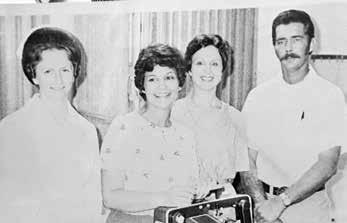
Did you know that activities and seasonal illnesses that come with cooler weather can trigger changes in blood sugar?
Whether you’ve been a diabetic for years or just recently got a diagnosis, you’re probably familiar with monitoring blood sugar and understanding what generally affects it — such as food, activity, stress and illness. What you may not be aware of is how the onset of cold weather can cause changes in your blood sugar.
Cold temperatures can stress your body, causing it to release stress hormones such as cortisol for a much-needed energy boost. “These hormones reduce insulin production and trigger your liver to produce and release more glucose, causing more glucose to remain in the blood,” says Heather Moore, RN, diabetes educator at WCCH. “This results in an increase in blood sugar levels.” She suggests preventing this by doing what you can to stay warm — doing some form of physical activity (walking, taking a fitness class or exercising with friends can be easy ways to get this in), having a hot cup of tea or keeping a blanket handy in the car and at home.

Another common reason for your body producing stress hormones in the colder weather is the onset of influenza. Getting the flu means your body needs to fight off infection, and it does this through — you guessed it — releasing stress hormones which boost energy and raise blood sugar levels. “Taking precautions such as proper hand-washing hygiene, getting your seasonal flu shot and eating clean, nutritious foods can go a long way in preventing unwanted sickness,” says Moore. Lastly, the holiday season brings about parties, get-togethers and family gatherings that may affect your regular diet. Altering your normal meal plan to eat higher-calorie foods can cause your blood sugar to spike, so it’s important to be smart when attending holiday gatherings. “Be sure to come prepared with a healthy dish, eat a small snack at your usual eating time if dinner is served later than normal, and don’t skip meals,” says Cynthia Chantlin, LDN, RD, dietitian at WCCH. “If you have a sweet treat, it’s okay as long as you eat less of other high-carb foods, like potatoes or bread.” It’s all about balance!
- Coffee —some people are more sensitive to caffeine than others, but it’s good to keep in mind that it can affect your blood sugar, even without sweetener.
- Losing sleep —getting quality sleep helps your body use insulin well. Make sure you’re getting enough sleep each night. According to the National Sleep Foundation, it’s recommended that adults get 7-9 hours of sleep per night.
- Skipping breakfast —it may seem harmless, but it can cause your blood sugar to increase after lunch and dinner.
- Time of day —blood sugar can fluctuate more in the afternoons and evenings and be harder to control.
- Dehydration —your blood sugar becomes more concentrated the less water you have in your body. Drink up!
- Nose spray —some sprays contain chemicals that prompt your liver to make more blood sugar.
● Regularly check your blood sugar. Check it more frequently if you have low blood sugar symptoms or feel ill. Testing your blood sugar in the winter may be more difficult or painful because of cold hands. Try using a heater or holding a cup of coffee or warm tea to warm your hands before testing. This will help you get a better reading.
● Check your skin and feet for dry, itchy skin daily. Cold weather brings dry air and indoor heaters can also dry your skin out, leading to cracks on your skin. To prevent germs getting into the cracks and causing infection, pay close attention to your skin and feet during the colder months so you can notice and treat problems early.
● Don't expose your medicines, supplies or equipment to extreme cold. Temperature has a significant impact on insulin, and it doesn't work once frozen, even if thawed. Keep it cool, but never let it freeze. Cold weather can also cause damage to continuous glucose monitors and insulin pumps.
Each month, WCCH hosts Diabetes Support Group meetings that are free and open to the public. Our diabetes education team along with featured guest speakers from the medical community discuss topics of interest to help you manage diabetes effectively. Attend one of our upcoming sessions!
Getting and staying active can be easier during the fall season. As the weather cools off – just a bit! – it’s more pleasant to be involved in physical activities.

“Being active can transform your body from the inside out,” explains Suzy Trahan, director of Dynamic Dimensions Fitness of West Calcasieu Cameron Hospital (DDF). “It can help to lower blood pressure and cholesterol, reduce body fat, improve circulation and keep joints and muscles working more easily.”
The benefits far outweigh the effort; however, maintaining or beginning a fitness routine takes commitment. Trahan says participating in group fitness classes can counter most of the common obstacles people face when it comes to exercising.



“Getting bored with exercising, not knowing what to do, and feeling out of place are common for many people,” says Trahan. “Group fitness classes are a great way to exercise because they address these common concerns. We have many types of classes, from high-energy cardio workouts and strength training to classes that emphasize flexibility, relaxation and core strength. One of the key benefits of group fitness is that you don’t have to figure out a workout routine on your own to get in the cardio, strength and flexibility exercises you need. The classes we offer are designed and tested by top professionals in the fitness industry to ensure they provide well-rounded, safe and effective workouts.”
The group fitness instructors at DDF are trained and certified, guiding members on correct form to help eliminate injuries and promote optimal results.
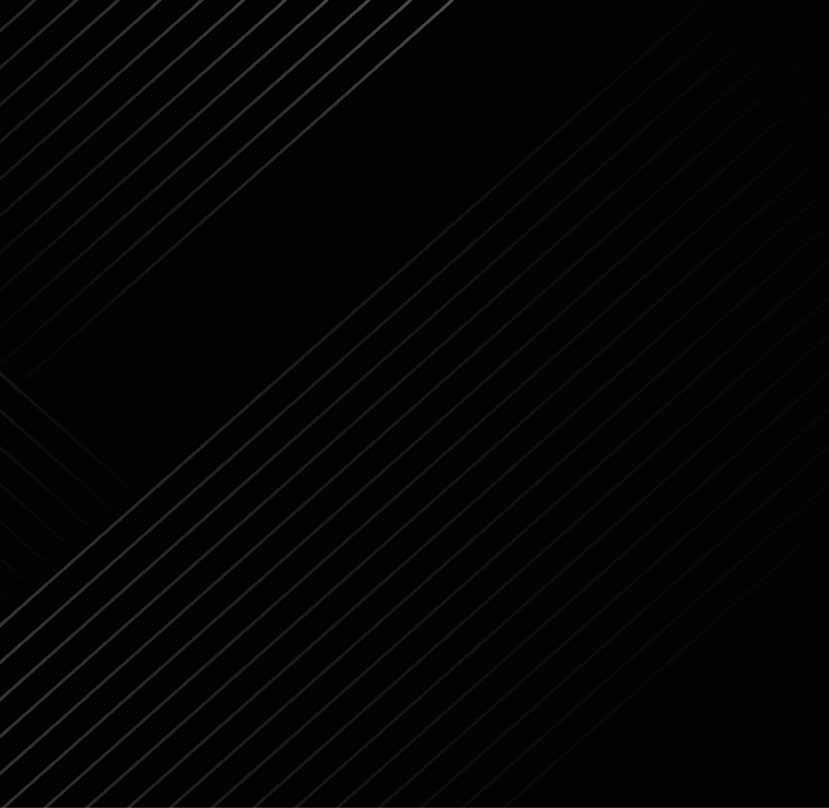
“One of the things I’m proud of is the welcoming atmosphere we’ve had throughout our 30-year history,” says Trahan. “We cater to participants of all fitness levels; whether they are beginning their fitness journey or have exercised diligently for years.”
Socialization can be often overlooked in fitness routines. Connections made in group fitness classes can provide motivation; the built-in accountability can help drive individuals to show up for class when they might otherwise skip a solo workout.
As you look ahead to fall activities, take a moment to assess your fitness and physical activity level. If it’s time to make a more dedicated effort, consider Dynamic Dimensions Fitness — any potential member can receive a free, four-day pass to check out their Sulphur or Moss Bluff locations. Learn more at dynamicfitnesscenters.com

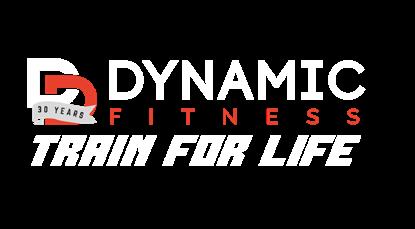
For questions about any of the information in this publication, call the West Calcasieu Cameron Hospital marketing department at (337) 528-4735.
• Nearly 1 in 8 women in the US will develop breast cancer in their lifetime.
• A mammogram is the best chance of detecting breast cancer early, when treatment is most effective.
• A mammogram can find breast cancer long before you or your doctor would be able to feel a lump in your breast.
• When caught early, the survival rate of breast cancer is 99%.
• Annual mammograms are recommended for women beginning at age 40.
To schedule your mammogram appointment, please call (337) 528-7320.
Your immune system is a complex system that works to protect your body from illness and infections. Take a look at some of the factors that influence your immune system, and how you can work to strengthen it this flu season. Do you have questions about the best recommendations for your specific health conditions? Ask your primary care doctor today!
Vaccines are one of the best ways to protect yourself from harmful diseases. Getting the influenza vaccine as well as the COVID-19 vaccine and recommended boosters will offer you the best protection against serious illness. The Centers for Disease Control and Prevention (CDC) recommends a yearly flu vaccine to help protect against flu viruses.
Be sure you are getting the nutrients your body needs by eating plenty of fruits and vegetables, lean protein, whole grains, and fat–free or low–fat milk and milk products. Try to limit saturated fats, cholesterol, salt and added sugars. If you’re unsure where to start or what foods are good for you, myplate.gov is a free resource from the U.S. department of agriculture where you can find information on healthy meals and get a customized food plan based on your age, sex, activity level and more.
The CDC recommends 7-9 hours of sleep per night for adults. Ensure you are getting at least 7 hours of sleep per night for improved brain performance, mood and overall health. Quality sleep can help reduce your risk for serious health problems and improve your immune function.
Wash your hands with soap and clean water for 20 seconds regularly, especially at key times, such as after using the bathroom and before eating. Be sure to always wash your hands after being in contact or caring for someone who is sick, after sneezing or coughing and after touching animals. Avoid touching your eyes, nose or mouth before washing your hands to avoid spreading germs.
According to the CDC, adults need at least 150 minutes of moderate intensity aerobic activity per week (brisk walking, water aerobics, riding a bike, dancing or hiking), and muscle-building activities at least 2 days per week such as yoga, Pilates, lifting weights, working with resistance bands or body-weight exercises like pushups and sit-ups.